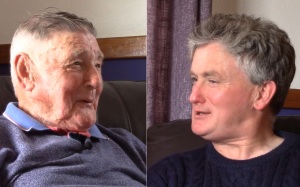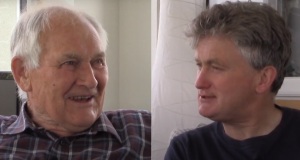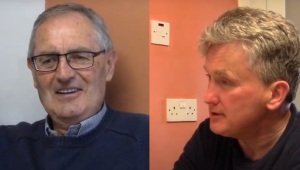Le Gordon Wells
 Our Craigard film was the first we ever made, and we keep returning to it for inspiration!
Our Craigard film was the first we ever made, and we keep returning to it for inspiration!
This week’s exciting news, following our posts last Friday and Saturday, is the addition of optional subtitles to the Island Voices Gaelic videos on our YouTube channel. When we asked who would be interested in such a development on our social media last weekend, the positive reactions quickly came back in their hundreds. (Some folk also wanted the reassurance that this would not mean the withdrawal of un-subtitled videos or of the Clilstore transcripts – we have no intention of doing either!)
Given the strongly expressed enthusiasm, the response from the Speech Recognition research project team has been instant and impressive. Systems have been set up to enable the automatic subtitling of all the Gaelic output on our Island Voices Videos YouTube channel, and all 20 films in Series One are already done – with the Craigard documentary in first place on the playlist. Keep an eye out for swift progress on Series Two and other films in due course!
The way in is through the CC “Closed Caption” button. To see any subtitles at all, that needs to be on. (So the default viewing remains clear of any textual additions.) You should now see the Gaelic subtitles.
But that’s not all – once you have them enabled, there’s another clever little trick that enables Google Translate to work on them. If you go into Settings (next to CC) and then click on “subtitles” you’ll find an “auto-translate” option, which then opens a wide range of languages into which the Gaelic subtitles can be translated. (WARNING: if you want English, DON’T go for the “English auto-generated” option first offered. Follow instead the “auto-translate” route and then pick English from the dropdown menu – unless you want a good laugh at “Artificial Intelligence”!)
Machine translation remains an imperfect science, of course, so any expectation of error-free renderings will inevitably be disappointed. Nevertheless, even without this extra facility, Gaelic learners stand to benefit just from using the Gaelic subtitles alone as an extra support for their eyes to help their ears recognise what they’re hearing.
So here’s the Craigard film again – this time with the new multilingual subtitle functionality added.
Nor is this the first time that the Craigard film has taken the lead in test-driving new innovations and community adaptations. Donald Mackinnon’s re-voicing of the original films in Gaelic and English was our first step along the road to the re-purposing of many of our films in Other Tongues. And, much more recently, it’s the film Valentini Litsiou chose for her Greek contribution. (Donald’s versions are actually hosted on a different YouTube channel, so the subtitling option is not available for them – but he did the film in both Gaelic and English, anyway!)
Donald in Gaelic:
Donald in English:
Valentini in Greek:
Who can say what the next innovation will be?
Tadhail air Island Voices – Guthan nan Eilean
Powered by WPeMatico


 Rövid dokumentumfilm a Ceòlas skót-gael zenei nyári iskoláról, melyet a Skócia Nyugat Szigeteihez, a Külső Hebrdákhoz tartozó Dél-Uiston rendeznek meg minden évben.
Rövid dokumentumfilm a Ceòlas skót-gael zenei nyári iskoláról, melyet a Skócia Nyugat Szigeteihez, a Külső Hebrdákhoz tartozó Dél-Uiston rendeznek meg minden évben. Μια ταινία μικρού μήκους για το κέντρο ημέρας Craigard στο Lochmaddy, στα Δυτικά Νησιά της Σκωτίας. Πρόκειται για ένα μέρος, όπου πολλά άτομα περνούν δημιουργικά και ευχάριστα το χρόνο τους.
Μια ταινία μικρού μήκους για το κέντρο ημέρας Craigard στο Lochmaddy, στα Δυτικά Νησιά της Σκωτίας. Πρόκειται για ένα μέρος, όπου πολλά άτομα περνούν δημιουργικά και ευχάριστα το χρόνο τους. Valentini still works for the same group, offering support in public relations, and has been involved in various other European projects. She’s always enjoyed this work because of the opportunities it’s offered to meet people of other cultures, who speak other languages, and who have other ways of thinking.
Valentini still works for the same group, offering support in public relations, and has been involved in various other European projects. She’s always enjoyed this work because of the opportunities it’s offered to meet people of other cultures, who speak other languages, and who have other ways of thinking. Mary Robertson is another well-known Benbecula resident, here talking to fellow Baoghlach Archie Campbell for the
Mary Robertson is another well-known Benbecula resident, here talking to fellow Baoghlach Archie Campbell for the  St Kilda, UNESCO-Welterbestätte im Nordatlantik, ist für viele Schottlandbesucher ein Traumziel. Der Kurzfilm berichtet über eine Gruppe von Tagesausflüglern, die vom natürlichen und kulturellen Reichtum des abgelegenen Archipels in ihren Bann gezogen werden.
St Kilda, UNESCO-Welterbestätte im Nordatlantik, ist für viele Schottlandbesucher ein Traumziel. Der Kurzfilm berichtet über eine Gruppe von Tagesausflüglern, die vom natürlichen und kulturellen Reichtum des abgelegenen Archipels in ihren Bann gezogen werden. Our translator and narrator for this film is Volker Labitzke. A keen traveller who has visited many places all over the globe, he found his paradise in the Outer Hebrides where he moved from Germany more than 10 years ago.
Our translator and narrator for this film is Volker Labitzke. A keen traveller who has visited many places all over the globe, he found his paradise in the Outer Hebrides where he moved from Germany more than 10 years ago. Moving on to Benbecula this month we feature Alec MacPhee from Nunton – Baile nan Cailleach – in our regular spotlight on contributors to
Moving on to Benbecula this month we feature Alec MacPhee from Nunton – Baile nan Cailleach – in our regular spotlight on contributors to 
 Happy Birthday to Alasdair Crois Mòraig!
Happy Birthday to Alasdair Crois Mòraig! We continue our exploration of the North Uist cluster in
We continue our exploration of the North Uist cluster in